The Best Poetry of Winter 2016
Swallows and Waves
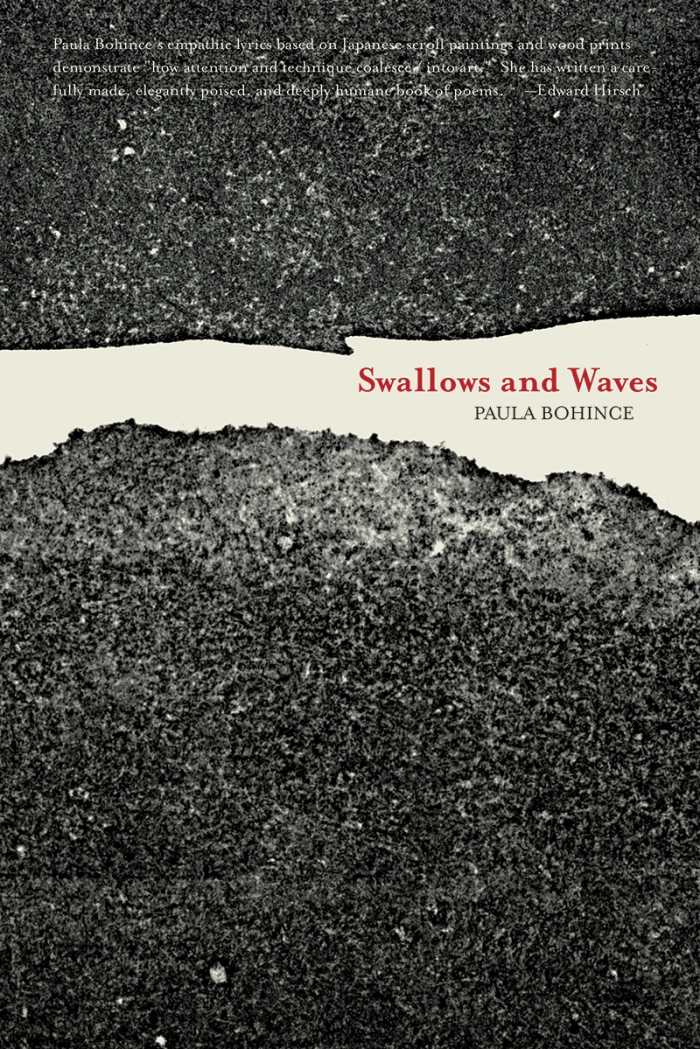
Paula Bohince
Sarabande Books
Softcover $14.95 (72pp)
978-1-941411-15-5
Buy: Local Bookstore (Bookshop), Amazon
Lithe and exacting, this collection draws inspiration from old Japanese woodblock prints and scroll paintings, resulting in lines at once visual and isolating. With two previous books and numerous awards and fellowships for earlier work, Paula Bohince lives in Pennsylvania.
Sparrows and Camellia
With thimble weight, the sparrows alight
on decorative branches.
Thumbs on a slightly bored body
twiddling the thinnest edges. The day’s
assignment: to while the afternoon
away. Maintain the blurred
between. It is easy
as friendship between love affairs,
vacant of extremity, passion. How cool
the light in this region of no awe. Welcome
middle register: sane, calm.
MATT SUTHERLAND (November 27, 2015)
Requiem for Used Ignition Cap
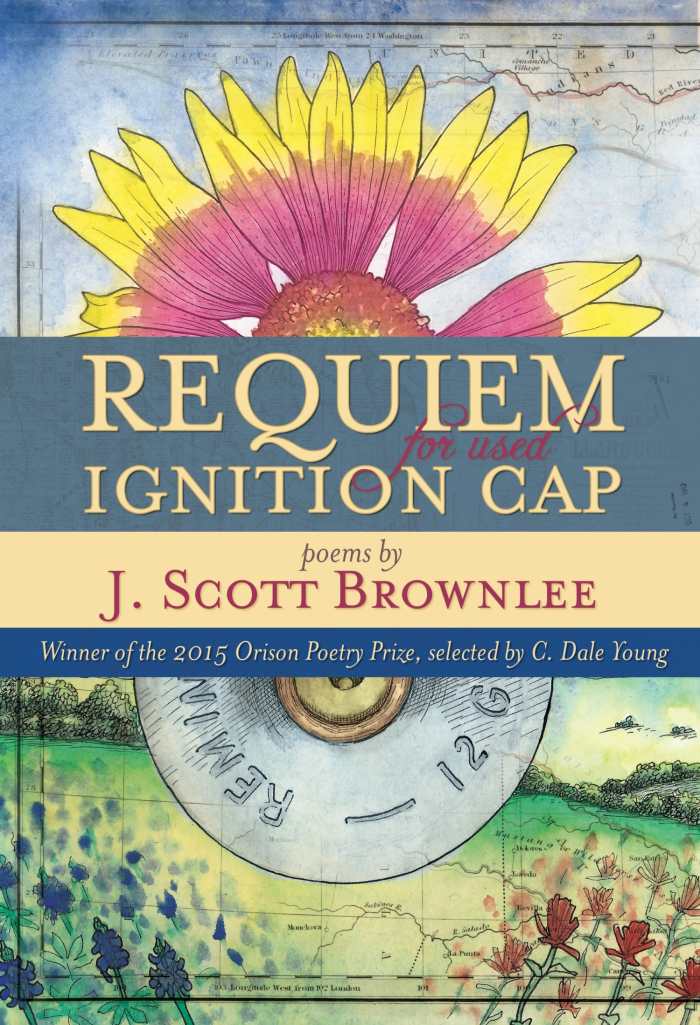
J. Scott Brownlee
Orison Books
Softcover $16.00 (76pp)
978-0-9906917-4-7
Buy: Local Bookstore (Bookshop), Amazon
J. Scott Brownlee is a founding member of The Localists, a literary collective based on place-based writing and cultural grounding, so it follows that he dedicated this debut collection to rural Llano, Texas, his home. He earned his MFA at NYU and currently works at the Wharton School of the University of Pennsylvania.
IV. Indian Paintbrushes
Our scent is sweet, but we will poison you.
Selenium-filled, we’re metallic creatures.
You wouldn’t think it at first glance. With our red
petals rising up from Texas dust you can’t see
that beneath them we’re pure parasite feasting
on spear grass roots. We require a host to turn
our bodies into what all beauty is at its source:
illusion. Call us greedy, the flawed fiends
we always have been, and forgive our natures.
We have wanted to bloom and bleed and be
honest guides here despite hundred-plus days
of heat where a nap beneath live oak shade
might just kill you. Here we have stolen
but also given. Here our bodies’ rot blooms
other wildflowers. Here in this landscape
of the damned where drought plagues
rattlesnakes, even, await your visit.
MATT SUTHERLAND (November 27, 2015)
Memories of the Cultural Revolution
Poems
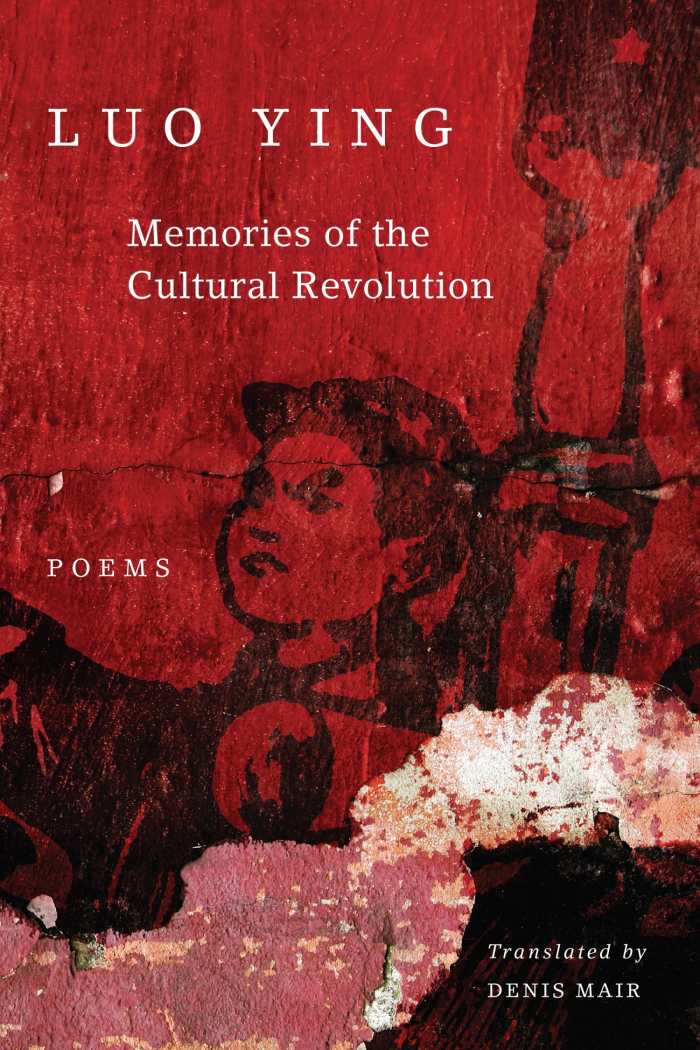
Luo Ying
Denis Mair, translator
University of Oklahoma Press
Softcover $14.95 (128pp)
978-0-8061-4917-2
Buy: Local Bookstore (Bookshop), Amazon
A billionaire capitalist shadowed by his Red Guard activism during China’s Cultural Revolution, Luo Ying is committed to facing down his own, and his country’s, Maoist demons through the excruciating vise of poetry. This collection, the latest of several, is a memoir in narrative verse and the honesty he shares in stunning. Luo Ying currently directs the Chinese Poetry Institute at Peking University.
Chicken Blood Injections
Liu Xiaobao’s dad got a shot of chicken blood, and he found it energizing
He said it was due to the rooster’s strength, because it had never mated
The neighbors pooled their money and went to purchase roosters in the countryside
The city was full of men strutting briskly to work
A line of men with roosters formed at the hospital door
Doctors busily stuck needles into chickens, drawing blood for injections
I don’t know if anyone died later, but a fad was underway
In a materialistic time, what else did people have to do?
People said the shots made their bodies lighter, gave their steps more bounce
It made eyes bright, minds clear, faces youthful, and hair like crane feathers
Some said it would bring you a plump baby who wouldn’t suffer as you had
Some said it kept you from getting hit by bullets in armed struggles
Liu Xiaobao’s brother wouldn’t get those shots, lest he start crowing or pecking
All over the city, people discussed how he had fallen behind the times
They said, “Going to college did him no good—it only made him stupid.”
MATT SUTHERLAND (November 27, 2015)
Literature for Nonhumans
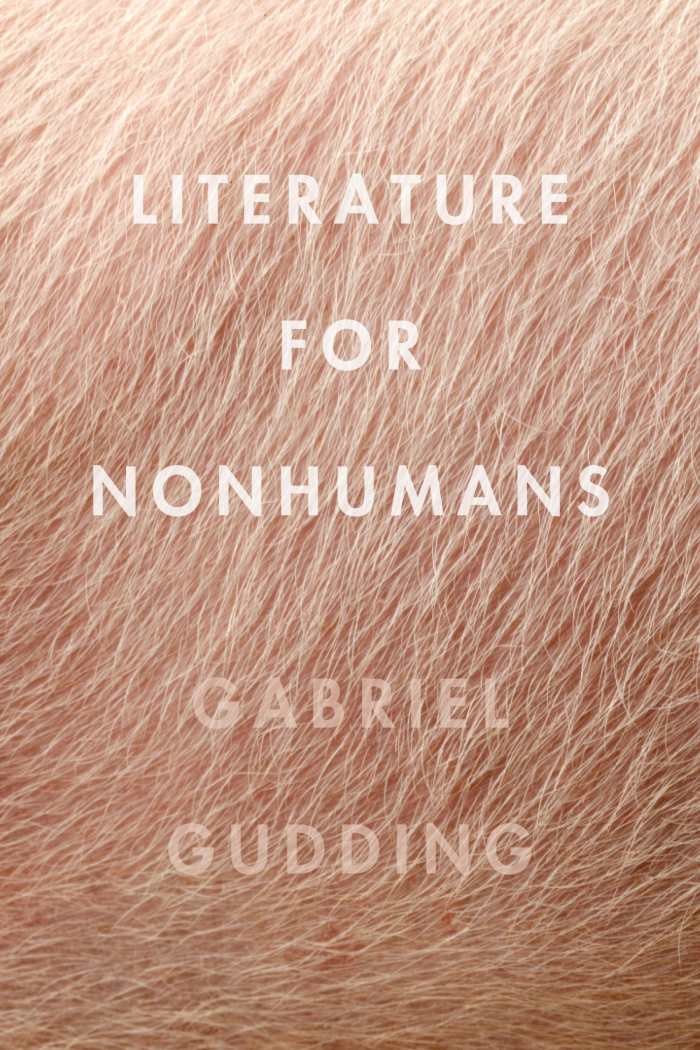
Gabriel Gudding
Ahsahta Press
Softcover $22.00 (144pp)
978-1-934103-63-0
Buy: Amazon
This wildly imaginative cultural takedown of Illinois history delivers an extraordinary lesson in humanism, animal stewardship, and inner rage. Very, very few poets have Gabriel Gudding’s intellectual chops, and his wordplay herein—some prose poetry, some lyric essay, some indescribable—is blistering and breathtaking. An acclaimed and prolific writer, poet, and translator, Gudding teaches at Illinois State University.
Our Fellow Drivers as the Analogs of Animals
Consider how readily we take our fellow drivers to be idiots.
We project onto them some kind of deficiency: a malignancy,
a stupidity, a naivety, a cognitive primitivism, an imbalance
of emotion—even a subjectless egoism and a moral insuf-
ficiency. Sometimes just a flatness of being: when they are
not malign or annoying or stupid, other drivers are to us
simply drab, ignorable.
If a driver delays too long at a stop sign, if he broaches
his turn too early, moves out of order, causes gridlock by
the self-serving insertion of his car into the crux of an in-
tersection, or if he otherwise does something to ensure his
own timely departure from a tangle while deepening the
entanglement of others, the being in the car becomes stupid,
and selfish, as selfish is a subset of stupid; and as the being
is stupid, it’s at once cunning and easily fooled; and because
selfish, he’s greedy, impatient, petulant. In sum he becomes
a total jackass. …
How is it that by merely cloaking the human body in sheet
metal, hiding the shapes and movements of this person’s
body and face, we can so readily animalize members of our
own species?
The question’s instructive. If we can with such facility do
this to members of our own species, famed (among ourselves
anyway) for our brilliance, by erecting a painted sheet of
shaped metal between us, think about how easily—and how
erroneously—we’ll do this to others who are hidden behind
the varying shapes and features of their bodies.
We treat other animals like we do our fellow drivers: as flat
and hypothetical beings. A hypothetical being is one that
we can see exists but whose existence is insufficient in itself
to merit full inclusion in our attentional space, insufficient
because it does not to us have an interesting mind. And it
does not have an interesting mind because it stands in the
way of our wants. …
If we can occasionally glimpse that we are this stupid and
this erroneously begrudging about members of our own
species, I wonder if we could consider how selfish and inane
we are when we knowingly put our own pleasure before
the needs, families, horrors, and sorrows of the other beings
who we refuse to see as fellow travelers.
MATT SUTHERLAND (November 27, 2015)
flicker
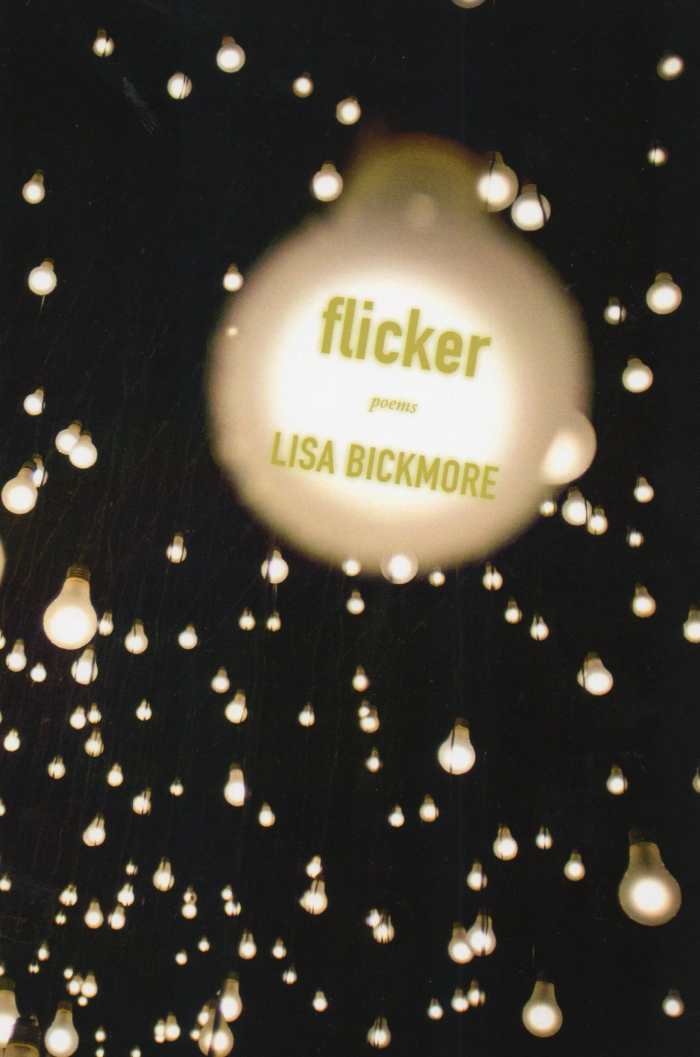
Lisa Bickmore
Elixir Press
Softcover $17.00 (72pp)
978-1-932418-57-6
Lisa Bickmore teaches creative writing and composition to fortunate students at Salt Lake Community College. Her poetry has appeared in numerous respected journals over the years, and she was recently awarded ten thousand euros for winning the Ballymaloe International Poetry Prize. flicker shows a confident, seasoned hand.
Self-Portrait as Half of Herself
Mother finding the daughter now mute
in the late summer ripeness of nameless plums;
in the way the grapes fall into hand,
all their sugar heavy and blooming
on the dusky skins; in the wine-odor
of falling petals from spent roses;
in the shimmer of gnats low on the lawn
cool over applefall: at the early hour,
easier to ignore her
plangent face, the brow of her turning
away, because I was listening
so intently for the soft dirt broken
by the insistent, whispering leaves
of plain beans, but she is there—there is no doubt
—she grieves that mother who helplessly
let her go, let her sow herself
into the ground as common seed,
as any ordinary pathos,
so unremarkable that it has been flayed
of its proper salt.
I have dreamed her
the brave girl heroine of a horror film,
but softer, her start as I wake
not of terror but sorrow, the sorrow
hinted at in our life within time,
when I go out before the light has broken
through the trees, into a garden full of seed,
turned dirt, absent the weeds, absent yet
the luxurious weeds, and as if the air
were holding its breath—
MATT SUTHERLAND (November 27, 2015)
Museum of Distance
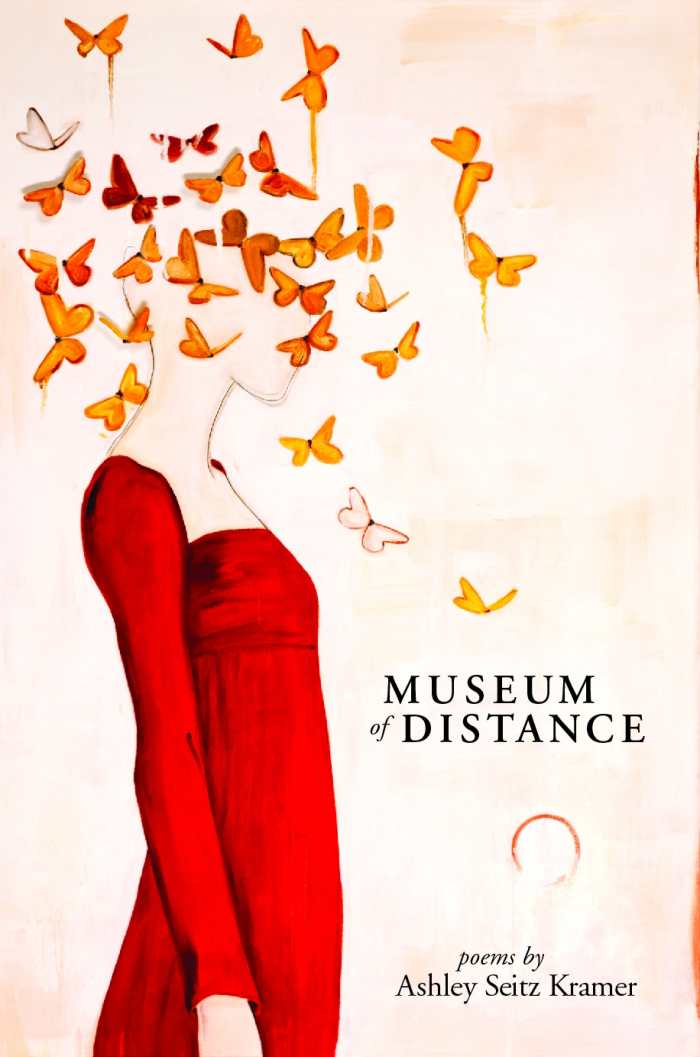
Ashley Seitz Kramer
Zone 3 Press
Softcover $14.00 (92pp)
978-0-9906333-1-0
Buy: Amazon
This debut collection has drawn widespread praise as an “Ovidian adventure” that blurs the “boundaries between the quotidian and the fantastic,” and for its use of thousands of images that “play a kind of dream-tag, each one prompting the next.” An assistant dean at Westminster College in Salt Lake City, Ashley Seitz Kramer has won the Ruth Stone Prize, the Robert and Adele Schiff Prize, and the Utah Writers’ Award.
Hound
You circle your own house with your dog
who knows when to sit before you ask him
as if both of you learned the same word
in different languages. You trust his language
more. He wakes when you wake dreaming
about the same high grasses. Another word.
No one knocks now when the snow
makes of you a warmer planet. So much
for the terror of your first child’s first seizure.
So much for the collision of cars, the spray
of glass, a brown belt left on the seat of a blue van
at the bodyshop. Did those people make it?
No. This kind of terror takes years to be made
like the fog that has settled on all the kitchen
tumblers. First the water, then its reason.
It takes years to arrive and when it does
even your dog, who is otherwise oblivious
to history and always a good boy, will whimper
for you in your own terrible language.
MATT SUTHERLAND (November 27, 2015)
Matt Sutherland


